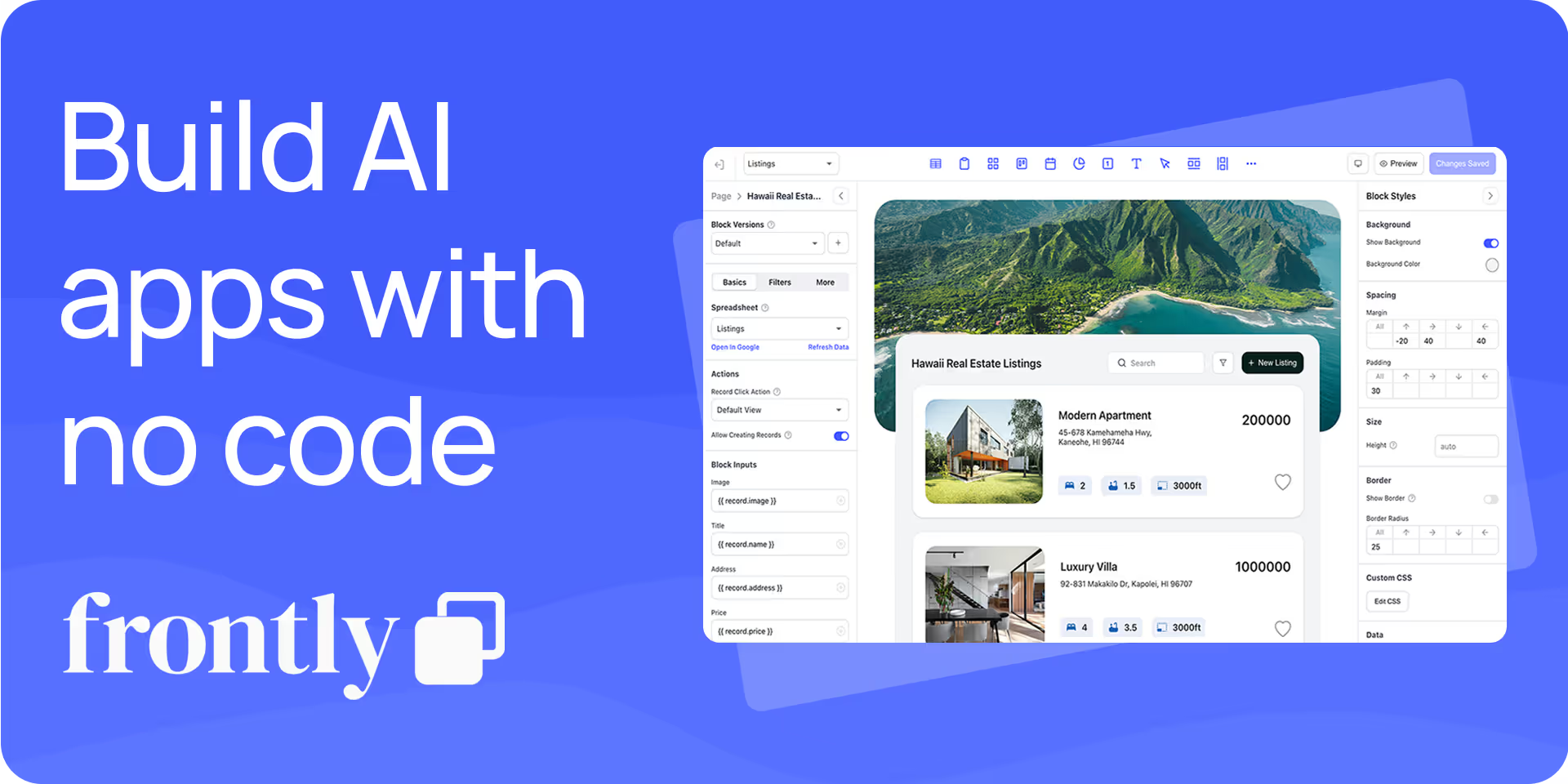
We envision a future where building custom software is accessible to everyone, regardless of technical expertise. At Frontly, our mission is to democratize app development by harnessing the power of artificial intelligence to transform complex coding tasks into simple natural language commands and intuitive interfaces.
Our innovative platform leverages AI-driven app generation, seamless spreadsheet integration, and flexible customization tools to empower individuals and businesses to create tailored web applications quickly and efficiently. By removing traditional barriers, we enable users to focus on solving their unique challenges and driving meaningful growth.
We are building a new paradigm for software creation—one where technology adapts to human intent, unlocks creative potential, and accelerates innovation across industries and communities worldwide.
Our Review
We've been tracking the no-code space for years, and honestly, most platforms feel like they're solving yesterday's problems. Then we stumbled across Frontly, and it genuinely caught us off guard. This isn't just another drag-and-drop builder—it's what happens when AI meets practical app development.
Founded in 2021 by Patrick Kelly in Victoria, Canada, Frontly has quietly built something pretty remarkable. Their core promise sounds almost too good to be true: describe your app idea in plain English, and their AI copilot (powered by GPT-4) will build you a working prototype in minutes.
The Magic Happens Fast
We tested this ourselves, and it's genuinely impressive. You tell Frontly you want a "client portal where customers can track project progress and submit feedback," and within minutes, you've got a functional app complete with dashboards, forms, and user authentication. No kidding—we went from idea to working prototype faster than it usually takes us to find the right template in other platforms.
What's clever is how they handle the backend. Instead of forcing you into their proprietary database, Frontly lets you use Google Sheets as your data source. For teams already living in spreadsheets (which, let's be honest, is most small businesses), this is brilliant. Your existing data becomes an interactive web app without any migration headaches.
Where It Really Shines
The sweet spot for Frontly is definitely small to medium businesses that need internal tools or simple client portals. We can see this being perfect for agencies building project dashboards, consultants creating client resources, or operations teams turning their messy spreadsheets into proper applications.
The visual editor feels familiar if you've used Figma, and the AI continues to help even after the initial build. Need to add a new feature? Just describe it, and the AI will suggest how to implement it. It's like having a junior developer who never gets tired and works at the speed of thought.
The Reality Check
Here's where we need to be honest: Frontly isn't going to replace complex enterprise development. The AI credit system can feel restrictive on lower tiers, and if you're building the next Salesforce, you'll probably outgrow it quickly.
But for the vast majority of business apps—the internal tools, client portals, and workflow helpers that actually move the needle—Frontly hits a sweet spot we haven't seen elsewhere. The free tier is genuinely useful (unlimited apps and users), and paid plans start at $30/month, which feels reasonable for what you get.
After spending time with dozens of no-code platforms, Frontly feels like the first one that's actually thinking about 2025 instead of 2015. It's not perfect, but it's pointing toward something exciting: a world where good ideas don't die waiting for development resources.
Feature
AI-powered app builder that generates functional app prototypes from natural language prompts
Integration with Google Sheets and Supabase as backend databases
Drag-and-drop visual editor for customizing app layouts and branding
Prebuilt templates and modules for common use cases
Automation integration with tools like Zapier, Pabbly, and Make
Custom actions, webhooks, and permission-based roles
Branded apps with custom domain publishing on paid plans








